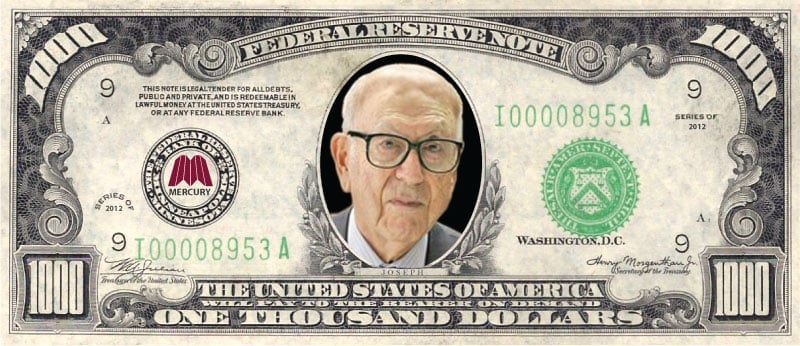
The insurance industry has spent about $100 million on ballot campaigns alone to defeat or overturn Prop 103 including $63.8 million against Prop 103, the $16 million Mercury Insurance spent in its failed 2010 campaign for Prop 17, and the $8.1 million Joseph spent so far this year on a proposed 2012 initiative nearly identical to Prop 17. Like Prop 17, the latest initiative would repeal a key consumer protection in Prop 103 and allow insurance companies to surcharge drivers who had not previously purchased auto insurance, even if they didn’t own a car.
Chairman Joseph is continuing his decades-old assault on consumer protections guaranteed by the 1988 insurance reform measure Proposition 103. The $8.1 million Joseph recently contributed went to a political action committee aiming to place an initiative on the ballot that would legalize new auto insurance surcharges by Mercury and other insurance companies that are illegal under Proposition 103. He is the sole donor to the deceptively named campaign committee, The 2012 Auto Insurance Discount Act, sponsored by the “American Agents Alliance with Support from California Insurance Providers for Competitive Prices and Consumer Discounts.”
George Joseph’s financing of the measure belies the phony committee name he hopes will confuse voters. The so-called “Agents Alliance” is actually run by the spokesman for Mercury's 2010 initiative, and has a Board of Directors in which 70% of the members are Mercury insurance agents, according to the Alliance's most recent corporate filing. The group called California Insurance Providers for Competitive Prices and Consumer Discounts appears to be a fabrication created solely for this measure, as it does not exist anywhere.
Over the last two decades, Mercury has unsuccessfully attacked several provisions of Proposition 103 aimed at protecting drivers from excessive rates and unfair discrimination, beginning in the legislature and extending to last year’s Mercury ballot initiative.
In 2003, Mercury Insurance was caught illegally surcharging people who did not have prior insurance coverage. Regulators and courts ultimately ordered it to stop. Undaunted by defeat at the ballot box and in court, Mercury Insurance pushed through the legislature SB – 841, a law that would allow Mercury to surcharge people without previous car insurance; a clear attack on Prop 103. The California Supreme Court found that the law was unconstitutional.
Mercury then sponsored Proposition 17 on the June 2010 ballot, which would have allowed the surcharge, and spent $16 million on a deceptive campaign. Consumer Watchdog ran a statewide grassroots campaign to defeat the measure, which was roundly condemned as a special interest power grab. Mercury’s current proposal, aimed for the June 2012 ballot, is virtually the same as Proposition 17.
The current proposal, like Proposition 17, would repeal Proposition 103's ban on considering a driver's insurance coverage history when setting rates and premiums. It would allow insurers to surcharge customers who had not purchased auto insurance at some point during the past five years, whether or not they had been driving. Consumer Watchdog estimates that those surcharges would increase premiums by as much as 40% or more for millions of Californians including students who went away for college, those who previously used mass-transit, and the long-term unemployed.









